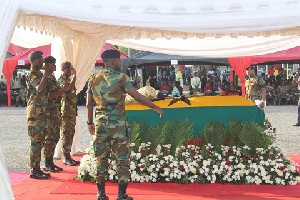“…It is a proud privilege to be a soldier – a good soldier … [with] discipline, self-respect, pride in his unit and his country, a high sense of duty and obligation to comrades and to his superiors, and a self-confidence born of demonstrated ability.”
(George Smith Patton Junior, 1885-1945, Lieutenant General, US Army, WW2)
The military has the distinct ability to add meaning to brotherhood (sisterhood), not in words, but in actions. Each day, the men and women of our military are challenged and are sometimes put into situations where the camaraderie builds itself - and the men and women are able build each other.
The uniform that we wear simply lays the foundation for what brings these select, and exceptional, men and women together; it is the call to duty, the ideals, and the shared title of being a Ghanaian and believing in what that means, that truly binds the servicemen and women together, across all three branches.
Many years back, one of my colleagues asked me if after leaving the military and as ex-soldiers we should expect the same level of camaraderie in a civilian job as we have had in the military. My answer was no, and partially yes.
The fact of the matter is that, there is nothing within the civilian workforce that can come close or similar to the bonding that occurs in the wardroom, ready room, or foxhole. The fact is that 'military personnel' in those environments get through with much hardship - long hours, stressful working conditions, danger to personal safety, separation from loved ones, and more. For this and many more, and the reasons they live through it together, they get through it.
This common denominator of self-sacrifice, teamwork, and covering each other contributes to individual bonding, unit cohesion, and, ultimately, the camaraderie in question.
In my considered opinion, professions such as the law enforcement, firefighting, and emergency medicine (take note of the common denominator) have a degree of camaraderie. Aside from that, it would be difficult to find a civilian job or profession that is close to the actual conditions of the trench/foxhole. Military camaraderie is what the civilian fear mostly.
Finding the military version of camaraderie out there in the civil or in a civilian profession is almost impossible. Some people do get close however and often it is simply a matter of time.
The military companionship and solidarity emanates from certain protocols that are inherent and distinctively exclusive. Think of the "cheers and farewell parties," the welcome on-board feeling, personal sponsors, turnover period, contact reliefs and more, are examples of the military's effort to ease the transition from one duty tour to another. Owing to the high frequency of duty tour rotation in the service, it is important that the system accommodates these transitions.
That's getting on-board and up-to-speed, with lots enthusiasm and no delays help to bring about the automatic "welcome to the club" experience that awaits most military personnel when they report to a new duty station. It is this deep sense of belonging that contributes to the camaraderie of military service. Civilians do not do it that way.
The outpouring of sympathy support for the late Major Maxwell Adam Mahama within the "Rank and File" is enough to inform the public that the kind of people with whom you work as the corporate culture of our organization definitely influence the feeling of camaraderie.
Once upon a time - An Army person and A Police officer were walking on a road with each other, then a 16 years old boy and his friend came towards them with a very respectful smile and said:-
To Army person---- Thanks for serving our Country.
To Police ----- Thanks for serving us.
Then they went ahead and his friend asked with confusion why would you say different things to each other.
The boy just closed his eyes, heard the rustling of leaves of tree around them and then takes a deep breath and said, "we, the citizens, are not a Country, we are in a Country we are just using and getting benefit of the resources of our country.
The country is serving us and the Army is serving this country. When we look at our flag and hear National anthem sound, we are filled with nationalistic feeling in the moment we get goosebumps and literally go crazy for our country and as moment pass, we forget but An Army person is always crazy for this country until he/she dies."
You have never lived until you have almost died - and for those who chose to fight, life has a special flavor, the protected will never know.
I entreat those who have no idea of what a colleague means to the soldier. Take a look at the people in those military foxholes/trenches and you can imagine how much each other value and care. They share much in the way of values, ethics, commitment, sacrifice, reliability, citizenship, and courage.
“People sleep peaceably in their beds at night only because rough men stand ready to do violence on their behalf." George Orwell
Soldiers see themselves as blood-brethren. They don't betray their colleagues no matter the situation. Can the same be said of the civilian workplace? Maybe yes, maybe no.
Opinions of Saturday, 10 June 2017
Columnist: Nana Akwah
Military camaraderie; what the civilian fears most
Entertainment














